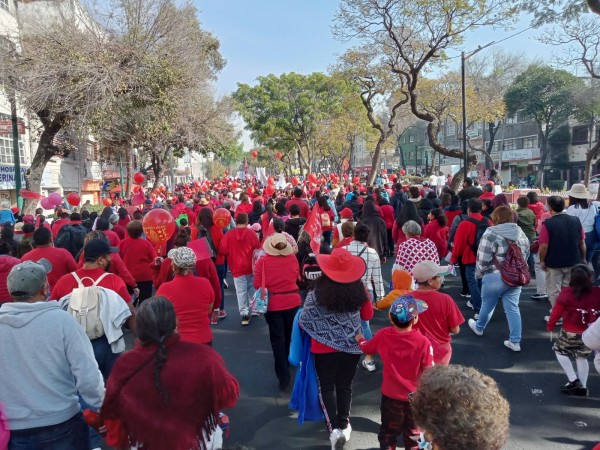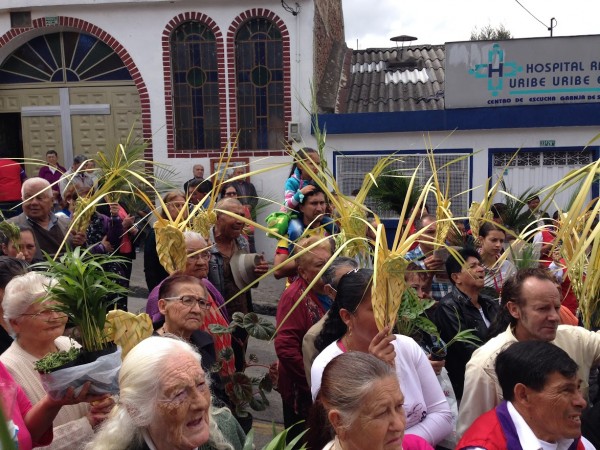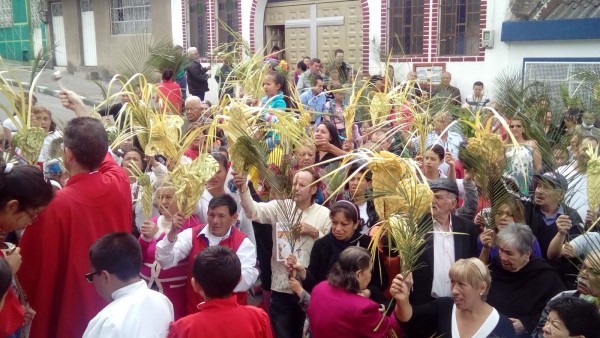
Every year we are starting this Holy Week listening to the episode of the entry of Jesus into Jerusalem, riding on a donkey and being cheered upon by the crowds of his disciples and followers, all of them fired up by the promise that he might be vindicated as the Messiah, which is why they acclaim him as the king of Israel, the son of David. This scene, which we find in the four gospels, has even been named as the “triumphant entry” into Jerusalem, an understanding that without doubt would have been alien to the mindset of Jesus, who always tried to avoid that the expectations of a messianic leadership could grow around his person.
The events that happened in Jerusalem in the following days, which we also listen to in today’s passion narrative, and which will culminate with his shameful death outside the city walls within just five days from today, are a cruel reminder about the fragile meaning that an enthusiastic crowd may carry: today’s approval will soon turn into deception, and later on into outward rejection, because Jesus is not going to fulfil the expectations of the people who were longing for a political leader who might guide them towards a more prosperous life and turn them into a powerful and respected nation among its neighbors.
The contrast between the episode of the so-called triumphant entry into Jerusalem today, cheered and applauded, and the way Jesus will exit the city carrying the wood of the cross, mocked and spat upon, couldn’t be greater. Only a group of women will remain at his side, knowing that the gospel Jesus preached with his life and his words has to be embraced and understood in the heart of every single person, far from the multitudes who only project upon their leaders their own dreams and ambitions.
Jesus did never allow himself to be fooled by the crowds who were asking for a messianic leadership to make their nation great again, and announced several times that they themselves would end up demanding his death, as it turned out. As followers of Jesus, we should avoid the ever-present temptation throughout history of populism and of yielding to the longings of enthused crowds of diverse political and social signs, always eager of finding leaders who can deliver their own targets and goals. The gospel of Jesus, yesterday, today, and forever, is a path of loving self-giving of one’s own life, which is made real in the encounter with our neighbor, far from the crowds and their wishes and longings, as Jesus himself showed us with his own life.

Tomorrow we will begin Holy Week and, following cycle B of the readings, this Palm Sunday we will read the Passion according to Saint Mark.
It is a story that begins with the intriguing scene of Jesus in Bethany, in the house of a certain Simon, nicknamed the leper. A woman arrives at the house and anoints Jesus’ head with expensive nard perfume, provoking the indignation of those who see it, who are scandalized and do not understand the meaning of her gesture.
The woman has anointed Jesus as the Messiah. And she has anointed him knowing perfectly well who he is, because she has gone to look for him at Simon’s house. She has no doubts about what kind of Messiah is the prophet of Nazareth: a Messiah who stays with a man known as the leper: that is, the impure, the marginalized, the forgotten, the rejected. The representative of all those excluded then, today and always.
This scene, and the dispute between the woman and those who do not understand her gesture (Jesus’ own disciples: who, if not them, would be in Bethany with him?) prepares us for the celebration of Palm Sunday. When tomorrow we will celebrate Jesus entering into Jerusalem, and we will receive him with our palms, we should ask ourselves which Jesus we are receiving. When we welcome him, and tell him that we want to receive him in our city, in our homes, in our world, in our lives… to which Jesus do we say all this?
Because we could be welcoming the same Jesus that the crowds cheered, who projected onto him their desire for power and prominence. Then we would be participating in the great misunderstanding of Palm Sunday: the crowds applauded a triumphant Messiah, destined to conquer power through the use of force, which had nothing to do with what Jesus represented. Or we could be receiving the Jesus who stayed in the house of Simon the leper, the Messiah who stood beside the marginalized, proclaiming that they were God’s favorites and who —because of that— ended up on the cross. The Messiah of the poor, anointed as such by that woman in Bethany.
If on Palm Sunday we do not welcome this humble Jesus, distancing ourselves from the frenzy of the crowds (which raraely understand God's love), we will not understand anything of that comes next: neither the washing of the feet on Thursday, nor the loving surrender on the cross on Friday, nor what the New Life of Sunday really means.

Today’s celebration, Palm Sunday, has a paradoxical nature. To begin Holy Week we gather in an open space, outside the church, and we bless palms and branches, remembering the crowd that received Jesus when he decided to enter Jerusalem riding a donkey. It is a festive moment. And yet, there is something gloomy and dark in these palms, in these branches: they identify the crowd that, even though that day welcomed the prophet of Nazareth with enthusiasm, a few days later contributed to his downfall by allowing itself to be manipulated by the authorities, demanding Jesus’ condemnation (as the reading of the Passion reminds us, during the Eucharist).
Palm Sunday, in short, puts a very serious matter on the table: the affirmation that the adherence to the project and the person of Jesus will always be, in the end, a deeply personal choice. You cannot be a Christian by osmosis, or because the person next to you is a believer, or because you were born in a society where the norm was to be baptized. Being part of a crowd that hails the Lord does not guarantee at all that I have actually assimilated the meaning of the Gospel. To sing songs of praise to Jesus in a stadium full of people where a huge Eucharist is being celebrated does not make of me a disciple, either. These can be stimulating and beautiful experiences, but they can never replace a much more personal and committed understanding of faith.
In fact, something that Palm Sunday underscores is precisely the danger of being in a crowd, which is the danger of ceasing to think for myself, and allowing myself to be carried away by the feelings of a passionate majority, whether in favor or against something or someone. Aldous Huxley, the famous author of Brave New World, pondered these matters in many of his works. In The Devils of Loudun (a lesser-known but no less extraordinary book he wrote) he states: «Being in a crowd is the best-known antidote to independent thought.»
Today we bless palms and branches, and we wave them in the air acclaiming Jesus. But it is good to remember that in them not everything is joy and celebration. There are also questions in them. If I had been in Jerusalem those days, what would I have done when, after hailing the Messiah, I would have seen him imprisoned in the hands of the authorities? Would my voice have joined those who asked for his death? Or would I have interceded for him, like Pilate’s wife, or would I have helped him carry the cross, like Simon of Cyrene? Do I follow Jesus because I am part of a crowd (volatile, with changing opinions) or as a result of a personal conviction, deeply matured and meditated in my own heart?

In the classic film Gladiator, at one point one of the characters advises the gladiator —the man used to win his bloody fights with speed and ease— and tells him, «It is not enough to win: the public wants an spectacle. Win the crowd and you will win your freedom.»
This is what we largely remember, in a tragic and dramatic way, during Palm Sunday. Those who control the masses (in this case the religious hierarchies) hold the real power.
There is a sharp contrast between the multitudes that sing «Hosanna, hosanna!» and the masses that shout «Crucify him! Crucify him!»
Last Sunday we read the story of the adulterous woman, and it reflects what Jesus’ will really is: not to get lost in a crowd, but rather to assume our responsibility, to be able to think as individuals and discern our actions with humility, compassion, and tolerance. The worst abuses and sins are often committed in the name of parties or factions: inequality, poverty, injustice, racism, exclusion, intolerance, corruption, are most often carried out by masses immersed in sinful structures. How easy it is to fall into dynamics of abuse and intimidation, almost without realizing it, when we are part of an unthinking and often unjust crowd.
How beneficial would it be to remember Jesus’ words to the group of men who wanted to stone the adulterous woman: «Whoever is without sin may cast the first stone.» I wish that in the crowds of Jerusalem each person would have assumed his or her own responsibility and realized that what was taking place before their eyes was not so much a trial or a legal action against Jesus, but the lynching of a person who became a nuisance because, although he was a leader, he could not be controlled by the political or religious powers.
Let us not become crowds that abuse the vulnerable (be they immigrants, poor, refugees, minorities), blaming them for our misfortunes to ease our consciences. In his passion at the hands of an embittered mob Jesus became the scapegoat, especially for those who wanted to win the crows. Ironically, he also became the innocent victim who atoned for the sin of the world.
(Picture: The author, celebrating Palm Sunday in Sabana Yegua, the Dominican Republic).
One of the critical characters of Palm Sunday is the crowd, the crowds. We do not know if they were two different crowds, one shouting Hosanna, and the other shouting Crucify him. The fact is that the crowds can be easily manipulated, as it happens in populist regimes that give bread and circus to the people in order to silence their critical voices and submit their will. On the other hand, crowds have a great influence on the development of a society, as in the case of popular revolutions.
Nowadays, of course, any reference to crowds has to do with the coronavirus pandemic. In this case, to what degree the attitude of the "crowd" may determine the development (or not) of a deadly disease. It is important to realize that what the multitude does depends on the attitude of each one of us. So, it is essential that we all, as individuals, act responsibly.
Misinformation is a huge factor that can come into play to manipulate the crowds. We live in a time when it is easy to be overwhelmed and even depressed by the amount of information we receive, to the point that at times we can’t distinguish between what is reliable information and what is not.
We receive information about a natural cure for the virus, about toilet paper’s fever, about political explanations, or about end-of-the-world religious-based arguments. Everything is mixed in this gigantic pool of information. We can blame the particular interests of the media, and we might be right, but that does not mean that we are exempt from our responsibility to be well informed. Traditionally, we distinguish between the inevitable ignorance that emanates from our own personal limitations, and the guilty ignorance: when it becomes very convenient for us not to know about certain things and let ourselves be carried away by the crowd. These days, we should fight against the latter, as much as we tenaciously fight against the coronavirus.

Today, Palm Sunday, we read the Passion of Jesus, as we will do on Good Friday. As we listen to the story we are invaded with distress and sadness, and even with some anger. The silence of Jesus can be difficult to accept. It can easily be interpreted as a signal of surrender, a fatalistic acceptance of fate. How can he fail to respond directly to either Herod or Pilate? His response to Pilate has some vague explanations about His kingdom not being of this world. Of course, Pilate does not understand. We might even think — right or wrong — that the governor was more than willing to help Him. Certainly, Jesus in the Praetorium was on trial, but he gives up his fundamental right to defend himself. We could wonder why he doesn’t answer Pilate with some witty phrase to disarm His opponents (as he has does before), or why he doesn’t give an inspirational speech to unnerve the masses? Why doesn’t he do some spectacular miracle as the people of Israel were used to seeing from Yahweh?
But no, Jesus goes to his passion “as lamb was taken to the slaughterhouse” (Is. 53.7) and that is at times difficult for us to accept. But then, after reflecting a bit, we realize that perhaps that silence was the only possible speech. Because the strategies of power, the dynamics and the spirals of envy, vengeance and hatred, can only be broken with silence, and perhaps even with death (which doesn't always have to be physical). Anything else would be like the arms race during the Cold War, to see who has “more.” Any action from Jesus would have put Him on par with the intricacies of power of Pilate, Herod and company. The only way to deescalate and dynamics of power is becoming a lamb led meekly to the slaughterhouse.
Martin Luther King, Jr., said that hate cannot drive out hate. We do not eradicate violence with violence, nor is power neutralized seeking spaces of power. We are to be witnesses of generosity and love, to show that we don't care about big or even small shares of power. That we don’t care if we don’t appear in the picture, that it's okay if we are not shown any appreciation for our actions. For some, this could be seen as a failure or even total defeat. But it is more meaningful than any victory achieved, even slightly, through the parameters of power. Maybe we will get there fully in heaven, but that doesn’t take away the fact that already, from this point forward, we should move towards that direction, toward that new Easter that is already near.
Probably Jesus, during his Passion, did wish to talk, to say something to Pilate and Herod, if only to defend his own disciples. But if he was to start arguing, then he would have joined their game. In the end, it turned out that his silence, so hard to understand at the time, was, three days later, his greatest speech and his greatest miracle.
Martí Colom
Today, with the feast of Palm Sunday, we begin the celebrations of Holy Week. We know perfectly well the story and its outcome, but nonetheless the power of the texts and the intensity of the various liturgies of these days will lead us one more year to experience a succession of deep and often contradictory feelings, an authentic emotional roller-coaster —especially during the Triduum: from the endearing warmth that one sees in the image of the group of brothers gathered to share a meal on Thursday night to the profound respect that causes to watch, at the end of that dinner, the simple and potent sign of Jesus, kneeling, washing his disciples’ feet; from the anxiety we experience seeing his loneliness in Gethsemane to the frustration produced by of his arrest; from the pain caused by the fracture in the loyalty between teacher and disciples (“everyone abandoned him”, the evangelist will tell us) to the outrage with which we respond to the cynicism and meanness of his accusers; from the sadness for his brutal execution to the exhilaration of the resurrection, which brings meaning to the entire story when it seemed to be irretrievably concluded. The liturgies will remind us that our faith is not a cold intellectual exercise: on the contrary, it begins with the thrill that leaves in us this extraordinary narrative, from which then we develop our theological reflection.
The adventure begins today with Jesus entering in Jerusalem. The episode anticipates the deep tensions that will bring about the final ending: the Galilean is received in the capital by an enthusiastic crowd, the air of the city is filled with palm branches, olive twigs and songs of joy. Yet, we realize that very few understand the message he wants to get across by riding a donkey. He wishes to be a messenger of peace but is welcomed like a warrior. In very few days the same people who cheered him will ask for his death on a cross. Holy Week begins, in a word, with the story of the failure of non-violence. For this is exactly the meaning of Jesus’ decision to enter the city in a gentle ass. The animal, a reference to Zachariah’s prophecy (1)constitutes a clear declaration of intentions from the master: he is indeed the Messiah, for he realizes that he is definitely anointed, soaked and trespassed by the Spirit of God. But (precisely because of such an awareness of the Spirit in him) he will be a non-violent Messiah, inspired by Isaiah («I gave my back to those who beat me, my cheeks to those who plucked my beard»)(2) and firmly established on his own personal experience. Let’s not forget that Jesus has invited his followers to love their enemies and to discard vengeance («when someone slaps you on one cheek, turn and give him the other»)(3).
The passion tells the story of the spectacular failure of this kind of Messiah: very shortly, when those who welcomed him with excitement will see Jesus under arrest and will understand the meaning of his entrance riding an ass (or perhaps will recognize that his non-violent proposal was for real), they will reject him without hesitation. Non-violence will we defeated by brutality and the last lesson of the prophet from Nazareth will be discarded.
What teachings can we draw from this drama?
First of all we must say, of course, that Jesus’ real failure would have been to fall into the temptation of power and his unavoidable companion —violence, thus betraying all his life and mission. Therefore, at the level of his personal coherence and fidelity to his principles, he does not fail at all.
Secondly at the level of ideals and values(the validity of which only time confirms or denies), Jesus is exemplary by proposing a way (non-violence) that today, two thousand years later, is seen by many (Christians and non-Christians, believers and non-believers alike) as the most noble, mature, constructive, sound and brave path that humanity can take.
However, we should not be naïve. And we should not be too proud of our own age either: the two previous considerations cannot obscure the fact that Jesus failed stunningly in his attempt to convince the people about the merits of non-violence. And it is important to confess that, most likely, today he would fail again. One has to embrace with realism the notion that nowadays, as it was the case then (in spite of the stand for peace that, as we said, many spouse) non-violence is far from being accepted by the majority as the best way to resolve our conflicts.
Actually, it is amazing to see all kinds of populisms thrive in our own time, and not just in the victimized countries of the south. We see how political leaders with simplistic and inflammatory messages filled with violent attitudes against those who do not share their views or who are just different (immigrants, refugees, foreigners…) gather support and votes in old democracies both in Europe and the Americas. Today, as in the past, proponents of non-violence have a tough job.
This reflection at the beginning of Holy Week does not intend to be pessimistic or discouraging. It is simply a matter of recognizing that the non-violence that Jesus was unable to make attractive to the men and women of Jerusalem today still needs friends and advocates. The failure of the Messiah who rode a donkey is a challenge to us, as well as an invitation to continue promoting peace untiringly —that peace that so often eludes us, the peace that we will only attain if we learn to forgive, to accept others and to reject with determination all forms of violence.
(1) «Rejoice heartily, O daughter Zion, shout for joy, O daughter Jerusalem! See, your king shall come to you; a just savior is he, meek, and riding on an ass, on a colt, the foal of an ass» (Zac 9:9).
(2) Is 50:6
(3) Lk 6:29




